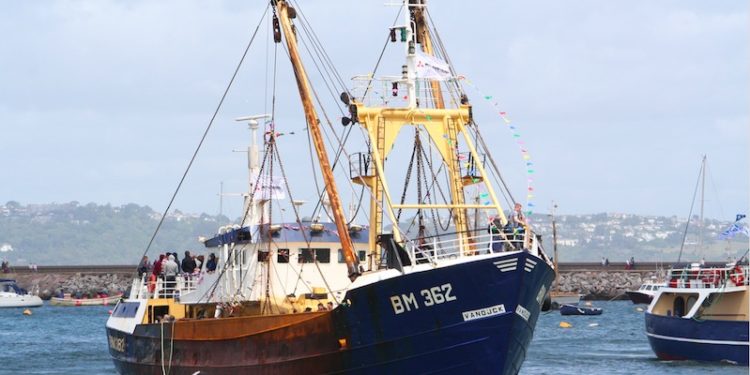A meeting held this week and attended by nine of the ten top king scallop producers and Producers Organisations with significant scalloping interests resulted in decisions that are expected to have far-reaching and beneficial consequences for the future sustainable management of king scallop stocks, which are a species of key importance to the UK fishing industry.
The meeting followed discussion of the Project Steering Board of the 2017 English waters king scallop stock assessment, the report of which has recently been finalised for publication by CEFAS. (ENG1402 C7226 Final Report, copies of which may be obtained before publication on request to CEFAS.)
‘Through the Scallop Industry Consultation Group and the Project Steering Board, the king scallop industry catching and processing sectors clearly see the importance of continuing with all project elements required to produce a robust stock assessment,’ commented South-West FPO chief executive Jim Portus, who chaired the meeting, held at Gatwick.
‘Now the industry has agreed to fund a charter vessel themselves to enable CEFAS to continue the programme of dredge surveys required to establish distribution and abundance estimates in all fishable areas. The industry considered the options and agreed the best way to fund the charter vessel for 2018 involved creating a voluntary ‘pilot’ levy fund, based on 2017 tonnage of scallops caught in the waters and from the stocks being assessed, wherever they are landed or processed.’
The industry has recognised that the best way was to enlist the support of the king scallop processors who handle the majority of product in the UK, in a way similar to the Seafish levy. All of those processors were contacted and most agreed readily to contribute as their part of a pilot industry-science levy fund.
AM Seafoods Ltd, Coombe Fisheries Ltd, Falfish Ltd, Laeso Fish Ltd, Macduff Shellfish (Scotland) Ltd, More Seafood Ltd, Seafood Ecosse Ltd, West Coast Sea Products Ltd and Whitelink Seafoods Ltd have all agreed to contribute to the pilot levy scheme.
‘It is the hope of the scallop industry that the Fisheries Minister will show his support for this interim and voluntary initiative by ensuring it is rolled-out as a government sanctioned scheme, possibly by becoming a ring-fenced part of the Seafish Levy, collected at source. It is planned that a ‘merit recognition’ scheme will be established for scallop processors signing up to the levy fund. Others will be invited to join the initiative in the coming weeks,’ Jim Portus said, commenting that the main purpose of the meeting at Gatwick was to sort out the details and to ensure majority, if not complete, engagement by the processing sector.
The agreed fund will be derived from a levy of 1.5 pence per kilo of liveweight king scallops. It was further agreed that SWFPO Ltd would be the bankers for the interim (2018) pilot fund which is estimated will pay for the entire 23 days of survey voyages in 2018.
The meeting also considered the tenders submitted to conduct the survey voyages. The winner of the tender was the 21.30 metre Evening Star PD-1022, to be skippered on the survey voyages by the owner, Gary Buchan, a highly experienced scallop fisherman.
‘We have made great progress today and concluded with a wonderful sense of achievement. The idea of a levy fund was mooted some months ago, but these things have to be set up with the full confidence of the participants,’ Jim Portus said after chairing the meeting.
‘There is a good deal of money involved and the industry does not take lightly its responsibilities for the task ahead assessing these most valuable of shellfish stocks. I want to thank all of the processors who responded to the call for involvement and all of the king scallop fishermen on the SICG and PSB. Their time is money and they have used it very wisely today.’
‘The successful outcome of the meeting held by industry will substantially contribute towards the development of robust stock assessments for these important fisheries,’ commented the Cefas Senior Inshore Fisheries Advisor.
‘This collaborative approach represents a new working relationship between industry, scientists and Government with the shared aim of achieving sustainable fisheries for the future.’









